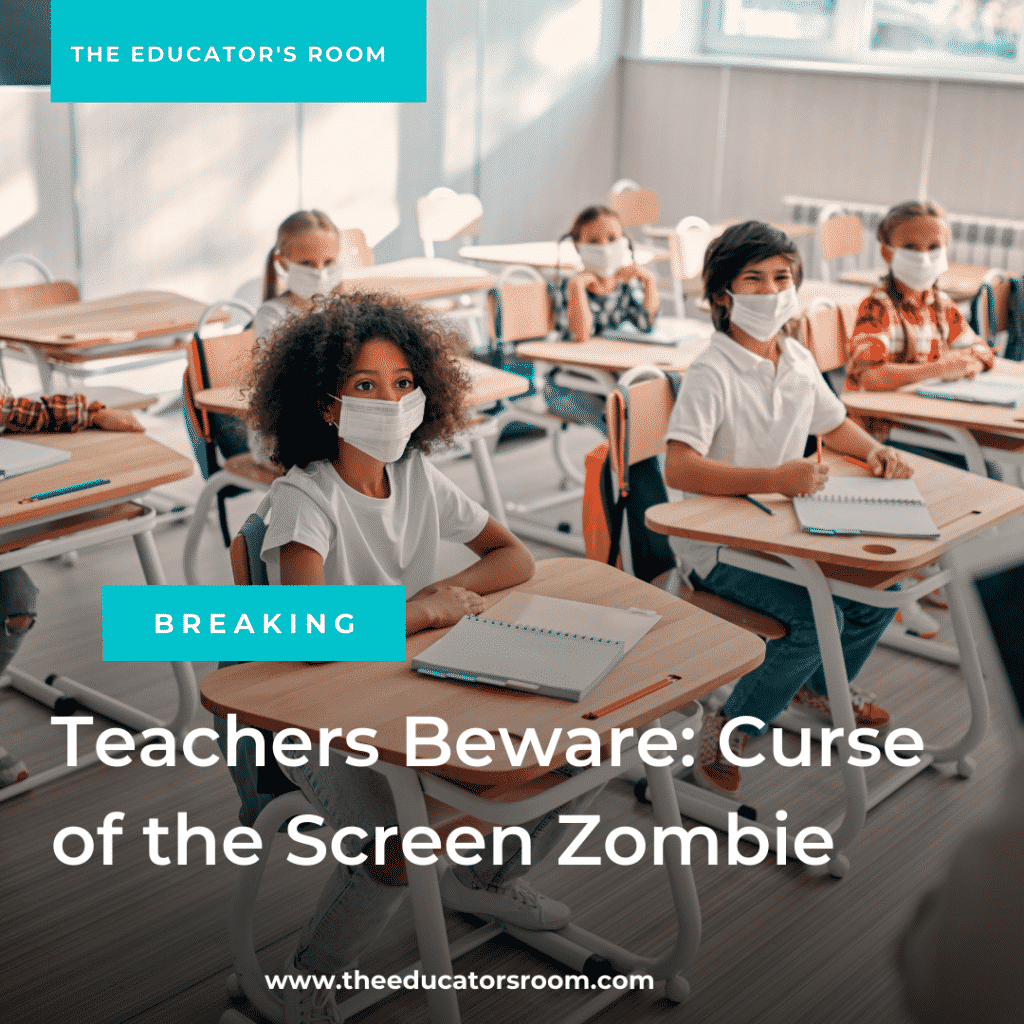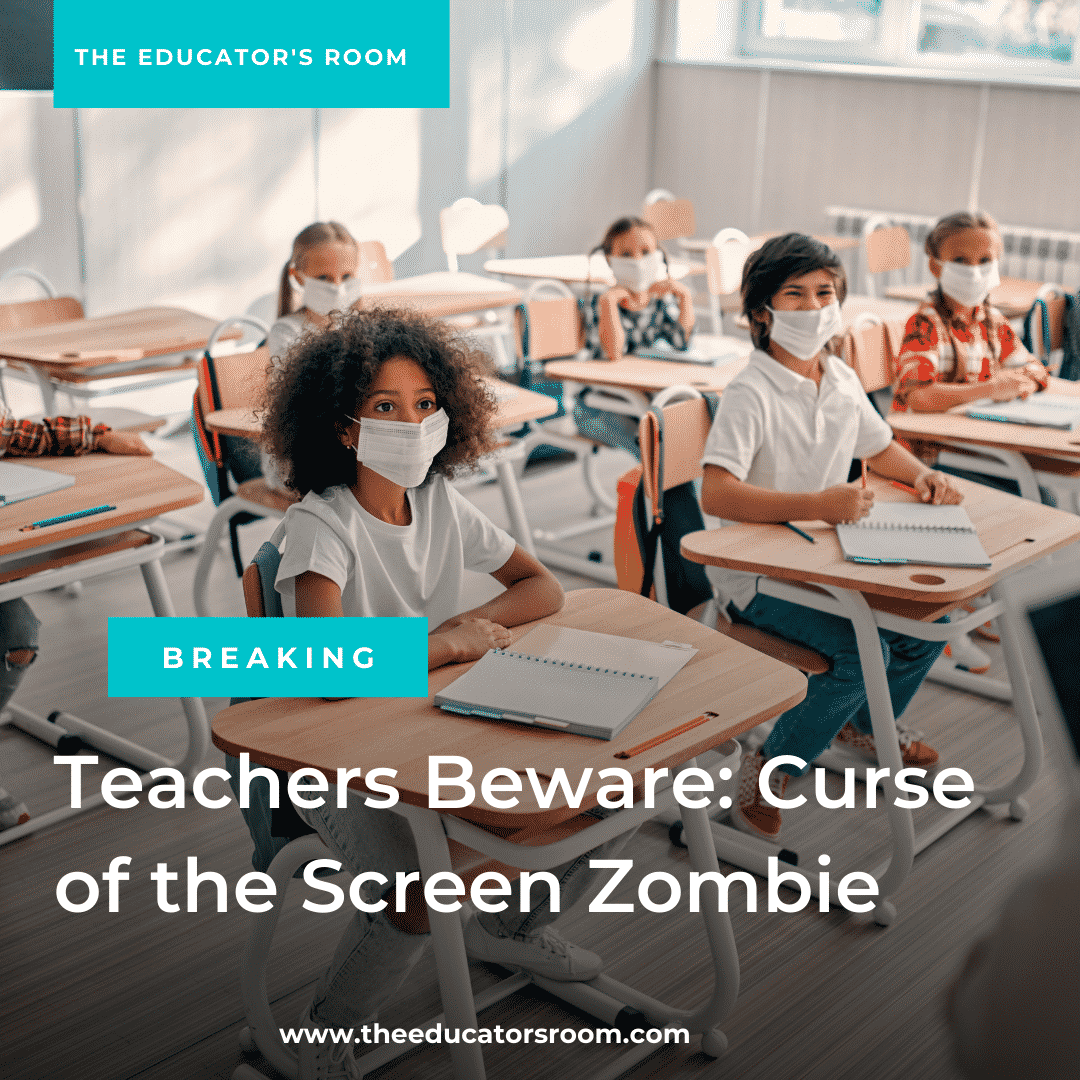For years, I watched in horror as the curse of the cellphone screen zombie took hold of every student I had, worsening with every update. If having to keep them off their phones all day wasn’t bad enough, most of their time spent in class was on a school-issued device, zombifying them by the hour. Any space between the screen and the student was vanishing.
It didn’t take long for me to find myself longing for a pen-and-paper-style classroom. Writing speeches. Holding debates. I wanted a class where everyone wanted to share their discoveries and was equally willing to listen—one where social skills flourished alongside academic growth.
Not only did I want to rely on classic methods of education again–having just missed the wave of tech-based classrooms as a student myself–I wanted to hold a mirror to their cell phone screen zombie addictions that have cursed them for years. And made them question their relationship with the world.
I had a plan. When students asked for extra credit, as they so often did, I always had the same article from a Scholastic periodical ready to broach the subject. I wanted them to consider the impact of cellphone screen time on their grade. The title said it all:
Are You a Cellphone Screen Zombie?
There I was, counting on a passage with some eye-opening facts and a few self-reflective questions to snap them out of zombie mode, pretending it was that easy.
Thumbing through the article one day, I remembered how this tech obsession only spread to the youth culture. It did not begin there. Adults have had the curse for years, and it’s no secret that we don’t make great examples.
I was attempting to get students to think critically about their own technology habits without ever considering my own bad habits. That makes this an issue that can only be addressed when everyone involved in education is held accountable.
“It is important to remember that educational software, like textbooks, is only one tool in the learning process. Neither can be a substitute for well-trained teachers, leadership, and parental involvement.”
– Keith Krueger
The Class of the Living Dead
Working at a school where there was a device for every student, I saw plenty of classrooms filled with screen-hungry students whose appetites were met every hour. Whatever app was being used in class was the only thing filling the silence. Assignments were mostly digitized–the most effective form of zombification—tests, games, and worksheets, all online.
When I began teaching, I used technology sparingly because I was afraid of being outwitted by those in my role with futures in computer engineering. I use my share of technology, but I’m certainly no expert. I lacked practice or training with it. Yet, many of the classrooms I subbed for in my planning period allowed me to observe modern practices in action.
Although, to my disdain, I watched rooms full of students absorbed in their tablets. No one appeared to be enjoying themselves, but no one was eager to exist outside their screen either. Each experience was limited to the confines of a glass screen no bigger than a piece of notebook paper.
I, too, was bored and attached to my screen, but my job couldn’t have been easier. The entire class appeared lifeless, and my job requirements dwindled. Replaced by a screen.
I found myself filling gaps with one-size-fits-all learning applications more often. Where tablets once seemed like a nightmare to me, I now saw them as a shortcut to all my teaching woes. With the rise of the screen zombies, fewer days were spent building skills important to life beyond our computerized society.
“Just as we can reach out further into cyberspace, so we withdraw from contacts in physical space…There are serious consequences here for any society built on the premise of personal interaction.”
Learning in the Digital Age
Technology has changed education and how the teaching profession functions. Already, technology has proved itself worthy by keeping schools running during the pandemic. It has done wonders to provide equal access to information for all people, giving students the opportunity to learn whenever and wherever they want. For teachers, we are able to streamline educational content and refine how we assess, communicate, and track student progress.
These are the blessings of technology.
As for the curses, we have developed dependencies on what roles technology can fill rather than how it can bolster education. We favor convenience over improvement, leaving that to the app developers.
As I mentioned earlier, this curse is not a one-lane highway. Adults have been afflicted no less. Look at the way we work, in any public place or in our homes. We practice the art of social avoidance by carrying around portable distractions in our pockets.
There have always been ways of ignoring each other, but it’s safe to say we have perfected it.
Zombie See, Zombie Do
Teachers find themselves in a tricky situation in the way of balancing computer skills and social interaction while maintaining a productive class. We want to keep up with the times, but we can’t help but question what we are sacrificing the more we commit to new forms of technology.
Even parents have voiced their concerns over technology in the classroom. In a survey completed by Oklahoma parents, many expressed concerns about technology being used as “a substitute for best practices.” Their fears include their child’s social development and ability to retain what they learn.
This disease of dependence is clear to everyone, but the blame should be as widespread as the curse itself. Research shows that parents are just as active as teens when it comes to being zombified by all their screens.
“A majority of parents also report that their phone can get in the way of spending quality time with their children.”
The only direction we should be pointing a finger is at ourselves. We cannot expect other people to change their habits until we acknowledge our own. Learning how to make the best of technology in the classroom will require teamwork.
The Cure for All Ages
Unless actual zombies rise from the grave, but technology isn’t going anywhere. We must accept this fact and learn how to socialize with it, not just through it. The best thing we can do is find an appropriate balance when we incorporate it into our curriculum.
Observe its use in your own classroom. Refine it. Explore the possibilities.
Other than being the primary source of instruction and coursework, consider how it can be used as a supplementary tool. Students can have their devices ready to research, take notes, and much more, all while actively involving themselves in the class with the teacher and their peers.
Technology needs to be more than the modern-day worksheet. The number of ways students can be creative with technology is endless. Let them prove that to you.
“We keep calling this generation digital natives as if they are simply whizzes at everything computerized. They aren’t. They need personal support, scaffolding, and reassurance that technology does not provide. It is simply a tool, not a teacher.”
As technology’s presence in education grows, so should our curiosity for using it in the most effective practices possible. Harmony between digital space and physical space in the classroom isn’t impossible. If we want to make the best of technology’s potential, this must be a collective effort. We all play a part in how future generations will view technology in their world.







